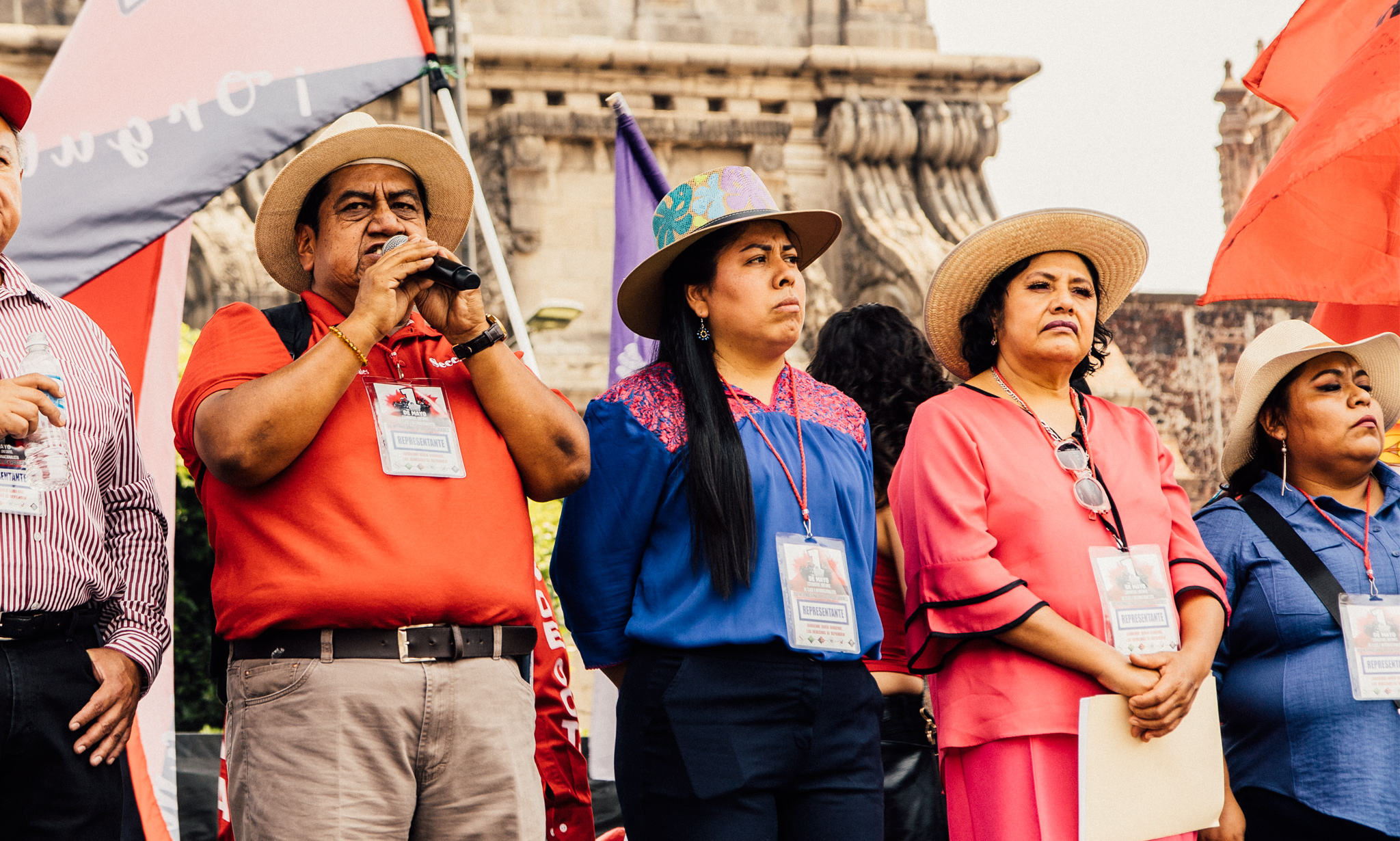IN DIALOGUE WITH TEACHERS, THE GOVERNMENT’S INTRANSIGENCE
This article by Alexia Villaseñor and Néstor Jiménez appeared in the June 3, 2025 edition of La Jornada, Mexico’s premier leftist daily newspaper.
What are the CNTE’s Demands?
Immediate repeal of the 2007 ISSSTE Law; restoration of a solidarity-based, collective, and intergenerational pension system; the full recognition of retirement based on years of service (28 for women and 30 for men) instead of the age of 65; the payment of pensions based on the minimum wage rather than on UMAs; the elimination of AFOREs as a privatization model (AFOREs are private companies who manage pensions as individual accounts, extremely restrictive and profitable for finance capital: they were introduced in 1997 and based on the privatized pensions introduced by Chilean fascist Pinochet); and a profound restructuring of ISSSTE to restore its social character.
After nearly four hours of dialogue in a new meeting between the National Negotiating Commission of the National Coordinator of Education Workers (CNTE) and the federal government yesterday afternoon, the teachers’ leadership maintained that federal authorities are refusing to accept their demands, particularly regarding the repeal of the 2007 law of the Institute of Security and Social Services for State Workers (ISSSTE). Therefore, they announced that their day of struggle will continue.
One day after the judicial election, in the early hours of the morning, the federal government and the teachers’ union agreed to a meeting for 12:30 p.m. at the Ministry of the Interior, once the coordinator agreed on a response to the federal government’s proposal, which, they maintained, does not address the underlying demands.
At a press conference following the meeting in front of Cobián Palace, Professor Eva Hinojosa Tera, union leader of Section 18 of Michoacán, asserted that the government proposed the same response as on May 28 (it is definitive), which the teachers rejected, she indicated.

The meeting was attended by the Secretaries of the Interior, Rosa Icela Rodríguez; the Secretary of Public Education, Mario Delgado; and the Director General of ISSSTE, Martí Batres.
On the teachers’ side, the general secretaries of Section 22 in Oaxaca, Yenny Aracely Pérez; of Section 9 in Mexico City, Pedro Hernández; of Section 7 in Chiapas, Isael González; of Section 34 in Zacatecas, Filiberto Frausto; of Section 14 in Guerrero, Elvira Veleces; and of Section 18 in Michoacán, Eva Hinojosa Tera, among others, were present.
Hinojosa Tera reported that they offered proposals to reach an agreement. One, he said, was to build a road to gradually repeal the ISSSTE reform; however, they gave us the same argument that there are no resources, that there is no budget.
He noted that they insisted on also repealing the 2012 education reform, which does not require financial support; even so, there were no favorable responses.
Another key demand was to request, once again, a meeting with the President of the Republic to resume dialogue and find a solution that will yield results.
Regarding the authorities’ proposal to continue the working group (today at 11 a.m.), the CNTE emphasized that the National Representative Assembly would make the decision to attend and also define the actions for the following days.
The leadership of the coordinating body reported that one of the agreements reached at the National Assembly of Representatives on June 1st was to maintain the position that, within the framework of the national strike, “together we enter, together we leave,” given reports that the Oaxacan teachers would abandon the protest.
They also decided to request the immediate establishment of tripartite committees to address the specific demands of each contingent of the coordinator.
At the state assembly of Section 22, it was emphasized that they will maintain the indefinite strike.
They clarified that the agreement reached at the tripartite meeting to allocate 800 million pesos for the next school year in Oaxaca will not be administered by the union, but by the education authority.
They clarified that these funds will be used to hire administrative staff needed in the schools, as well as to generate reclassifications, promotions, and payment of outstanding hours, among other processes pending since 2015.
Who Owns the AFORES?
There are 10 AFORES, that as of 2025 manage more than 7.18 trillion pesos (401 Billion USD). The AFORES system, modeled on Chilean fascist dictator Pinochet’s privatization of pensions, have been criticized by international pension industry observers for lacking sufficient oversight. The Mexican government has cited the complexity of the system as a reason not to de-privatize it, which begs the question, if the pensions are too complex to return to the public, how can they be meaningful overseen and regulated?
AFORES accounts are mandatory for every worker: they cannot withdraw from the system or manage the fund themselves or collectively with their union, such as with the Ontario Teachers’ Pension Plan, which manages over $188 billion USD).
1. AFORE Coppel – Coppel Group
2. AFORE Azteca – Grupo Salinas, owned by Ricardo Salinas Pliego, an ultra-right wing billionaire who is fighting in the courts to not pay the 35.450 billion pesos ($1.8 billion USD) in taxes he owes to the Mexican government.
3. Citibanamex Afore – Citigroup —in the process of being sold (USA)
4. Afore XXI-Banorte – Banorte
5. SURA – SURA Group (Colombia)
6. Profuturo – BAL Group (owners of the high-end department store El Palacio de Hierro)
7. Principal – Principal Financial Group (USA)
8. Invercap – Private investment fund
9. PensionISSSTE – The only public pension, limited to state workers
10. Inbursa – owned by Carlos Slim, one of the richest businessmen in the world, who recently advocated ending the public pension system and abolishing the retirement age in Mexico, and met with Claudia Sheinbaum last week.
-
CNTE Announces 72 Hour National Strike & March to Mexico City’s Zócalo
The class-conscious teachers union will also make “courtesy visits” to the embassies of countries who committed atrocities against Iran, to show their rejection of US imperialism.
-
Normalista Students Block Morelia Avenues While CNTE Teachers Occupy Education Secretariat
Trained teachers were protesting the lack of placements, while the CNTE union demanded the state government meet its hiring and salary obligations.
-
Education Dissident Marx Arriaga “remains the voice of the state, let’s not be fooled”: Specialists & Teachers
Critics point to the alternative teaching and learning model of the CNTE, which aims to bring students and the community closer together.




